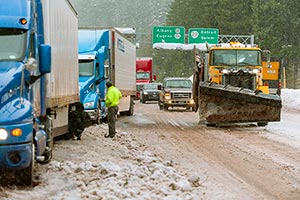Oregon Searching for Road Funds Amid Major Budget Crunch

Oregon’s budget deficit is approaching $2 billion at the same time that its Department of Transportation says it needs another $545 million a year just to maintain the state’s roads and bridges.
Oregon’s House and Senate transportation committees are searching for solutions so seriously that, aside from their own separate discussions, they have formed an eight-member joint committee that meets twice a week in public for the sole purpose of trying address the funding gap.
“The Speaker [Tina Kotek] has [said] we need another $1 billion a year for transportation,” Oregon Trucking Associations President Jana Jarvis said. “Do we have a lot of pent-up demand in Oregon? Yes. Do we have a lot of fix-it projects? Yes. Do we have capacity needs? Yes. Could we easily spend $1 billion a year? Yes. But we can’t afford it. We’re going to have to start prioritizing and addressing some of our most important needs.”
ODOT spokesman Travis Brouwer said the $545 million the department believes it needs annually for the next two decades would be divided between $350 million for pavement, $115 million for bridges and $80 million for culverts.
“The shortfall is continuing to grow every year largely because our system is getting older,” Brouwer told Transport Topics. “The majority of the bridges on our state highway system were built before 1970, so they are at or approaching their typical 50-year lifespan. We have completed a $1.3 billion, 10-year bridge program that let us replace or repair about 271 bridges, which is about 10% of the number on the state highway system. But we have to deal with the other 90%.”
Brouwer added, “We’ve been able to take care of our pavement and bridge needs to date, but we see that our resources in the long term aren’t going to be sufficient. Federal funding, which we rely on for most of our preservation and highway expansion, has flattened out, which means it’s really declining in absolute dollars.”
One answer is a fuel-tax increase that wouldn’t please OTA’s members, Jarvis said. They don’t pay diesel fuel taxes, but do pay what amounts to 98 cents per gallon via the nation’s only statewide weight mile tax. Constitutionally, trucks are required to pay the equivalent of a third of whatever increase passes, Jarvis said.
“That’s more than anybody else [in the nation],” Jarvis said. “How much more do you think my members will absorb? The 30-cents-per-gallon increase in 2009 was tough. Do we think we can go much over that again? No.”
Jarvis said that ODOT hasn’t helped its case for more funding with the Pioneer Mountain Eddyville project on U.S. 20, whose promised cost doubled before it was completed last year.
“There’s a lot of pushback about how well ODOT is being managed before we start handing them more money,” said Jarvis, adding that she sees a 50-50 chance of transportation funding increasing this year in Oregon.
Brouwer, who noted that Oregon’s registration and title fees are the nation’s lowest and thus a reasonable target to be raised significantly, is more optimistic.
“There seems to be a bipartisan consensus in the Legislature on tackling transportation funding, so we’re hopeful that will pay off in a significant investment in Oregon’s transportation system,” he said. “They’ll look at opportunities to raise the gas tax — which [at 30 cents per gallon] is kind of in the middle of the pack nationally but much lower than in Washington, our neighboring state — as well as the weight-mile tax.”




